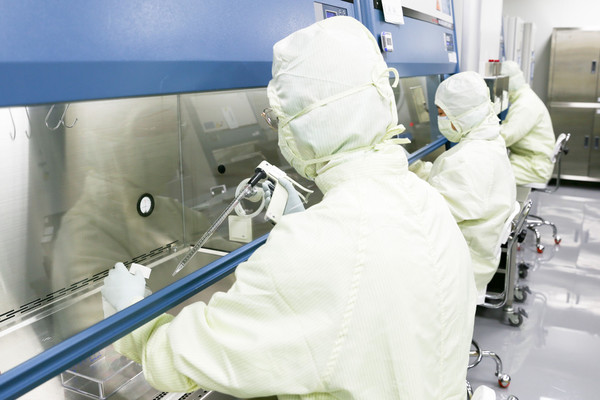With advanced biopharmaceuticals in the limelight, Korean companies are rushing to enter the CDMO (contract development and manufacturing organization) market to produce high-tech biopharmaceuticals such as gene and cell therapies.
The Korea Biotechnology Industry Organization (KoreaBIO) said in a report on April 5 that the U.S. FDA and the European Medicines Agency are expected to approve 10 to 20 cell and gene therapies annually, respectively, by 2025.
There were 237 ongoing phase-2 trials and 72 phase-3 studies of gene therapies. In cell therapies, 211 trials were in phase-2, and 25 trials in phase-3, according to KoreaBIO.
As the demand for corporate R&D and production for cell-based immunotherapy, gene therapy, and cell therapy could surge, there might be a temporary bottleneck in manufacturing, KoreaBIO said. Thus, the role of the CDMOs for cell and gene therapy will become more important, it noted.

Catching up with the global trend, Korean companies have recently announced a series of plans to enter the CDMO business.
They said they are preparing GMP facilities and production licensing because they will have to provide full-cycle services from R&D to clinical trials to production.
Under the Act on Safety and Support of Advanced Regenerative Medicine and Advanced Biopharmaceuticals, which took effect in August last year, a company needs “human cell management business approval” from the Ministry of Food and Drug Safety to collect, process, and supply raw materials for high-tech biopharmaceuticals such as human cells.
Last month, GC Cell said it obtained authorization for the human cell management business for the first time in Korea among domestic biopharmaceutical manufacturers. Its Cell Center, established in Yongin, Gyeonggi Province, in 2018, has advanced production facilities at the cGMP level, optimized for cell therapy production. The plan is the largest of its kind in Korea, the company said.
On April 7, CHA Bio Lab, a subsidiary of CHA Biotech, said it obtained the human cell management business approval to start the CDMO business.
The permit will allow the company to handle all human cells, including blood, fat, placenta, and umbilical cord, it said.
CHA Bio Lab plans to collaborate with CHA Biotech, which has various cell technologies, to accelerate CDMO business.
Daewoong Pharmaceutical announced in January that it would join the CDMO bandwagon for advanced biopharmaceuticals. After getting the permit for manufacturing cutting-edge biopharmaceuticals, the company is preparing to apply for human cell management business approval. Daewoong reportedly renovated a part of Yongin Bio-Center as a GMP (good manufacturing practice) plant for cell therapy and recently completed the renovation.
Pharmicell, a developer and seller of stem cell therapy, also said in December that it would enter the CDMO market for stem cell therapy.
The company said it received a new regulatory review on all stem cell-related licenses after implementing the Advanced Bio Act.
Industry officials said the government needs to update the management system's details to help companies enter the CDMO market for high-tech biopharmaceuticals.
“The Advanced Bio Act is not complete and adding new content continuously,” an industry official said. “So, companies are quite confused. To meet the criteria for the permit, we have to ask the food and drug safety ministry everything from A to Z.”

